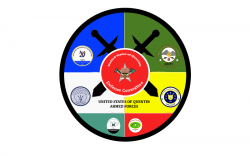Quentinian Defense Committee
| Quentinian Defense Committee | |||
|---|---|---|---|
| |||
| General Information | |||
| Role | Advisory committee to the President, JSMC, Cupboard, and military planning committee | ||
| Established | January 18th, 1887 | ||
| Constituting Documents | Executive Order Military Communications and Advisory Act | ||
| [[image:|225px]] | |||
| Chip Rodriguez Executive Building Mechanicsburg, GA | |||
| Members | |||
| Chairman | Chloe Livingstone | ||
| Vice Chairman | George Davidsman | ||
| Parent Agency | Department of Defense | ||
The United States of Quentin Defense Committee (DEFC) is an executive body of senior uniformed leaders in the United States of Quentin Department of Defense which advises the President, Congress, specifically the Joint Subordinate Military Council, and members of the Cupboard on issues of national security and defense. The body also is the head committee for discussion of military tactics among leaders of the Armed Forces during wartime. The DEFC consists of leaders from all armed service branches of the military except for the Starkkae Corps, along with the Commissioner of the Quentinian Intelligence Department, and is headed by its chairperson, who is by definition the Supreme Commander of the Quentinian Armed Forces, currently Chloe Livingstone. Besides the Supreme Commander, the committee consists of the two most senior Generals of the Quentinian Army, the Homeland and Foreign Admirals of the Quentinian Navy, the Orbital and Strike Commanders of the Quentinian Space Force, the two most senior Air Force Commanders, and the Director of Defense Force Operations for the Fort McCarthy Defense Force. All in all, the committee consists of 11 members, who are all ex officio members of the Committee.
The DEFC was founded in 1887 after the Quentinian Defense Committee Executive Order by President Milo Murphy, after the Secession of Mayberry Logan years prior. In 1927, with the Greater Venturian War looming, Congress passed the Military Communications and Advisory Act to establish the procedure for the DEFC to advise the Joint Subordinate Military Council, as well as have a more established structure in the hierarchy of military operations of the nation. Together, the DEFC cannot declare war or execute operations independent of administration such as the DOD or President, however often have the greatest voice in the government as to whether or not to commit to military operations, as the committee members are considered the most knowledgeable on matters of national security.
